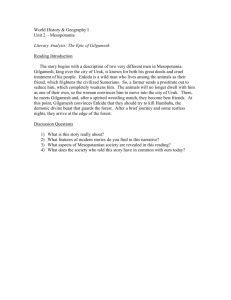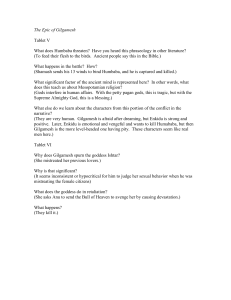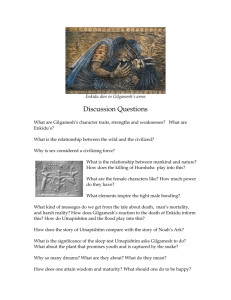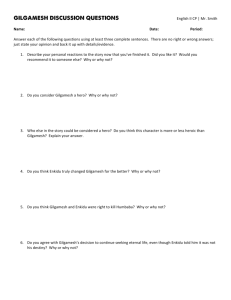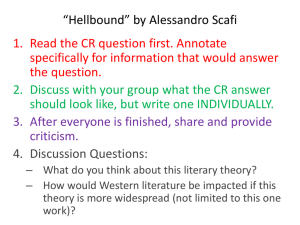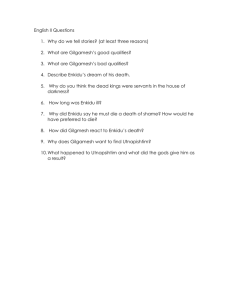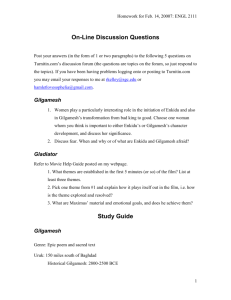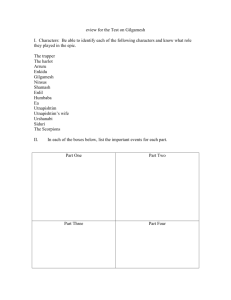GILGAMESH
advertisement
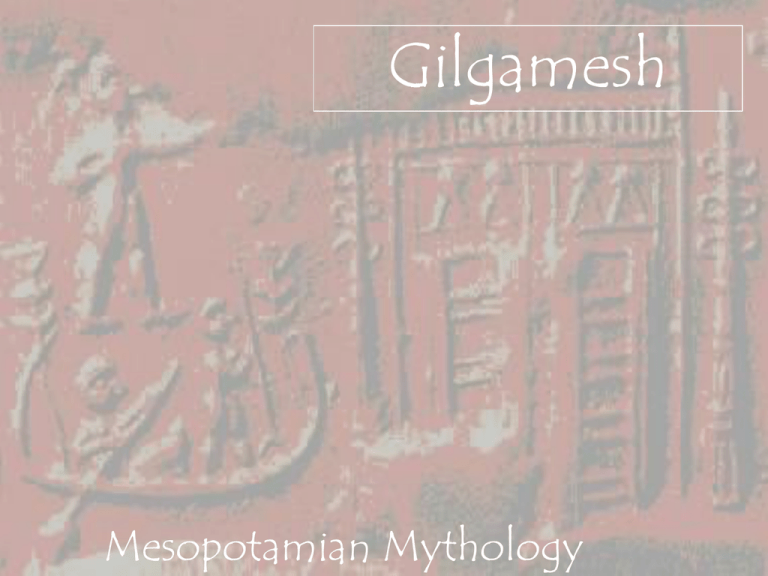
Gilgamesh Mesopotamian Mythology Found in Two Cultures SUMERIANS BABYLONIANS/AKKADIANS Mesopotamian Societies Sumerians •first major civilization (3000 BCE) •Uruk (and other cities) •Developed cuneiform writing •elaborate mythology and cultbased mythic poems Babylonians / Akkadians •later (c.1200-600 BCE) •myths based on Sumerian myth The Gilgamesh Epic The OLDEST KNOWN written Text. The standard version was discovered in 1849 by Austen Henry Layard . Translated into English in 1888. This poem is the most popular piece of literature in Mesopotamia, found in many different languages and versions across 2500 years. Gilgamesh INTRODUCTION – TABLET ONE I shall tell the land of the one who learned all things, of the one who experienced everything, I shall teach the whole. He searched lands everywhere. He found out what was secret and uncovered what was hidden, he brought back a tale of times before the flood. Gilgamesh INTRODUCTION – TABLET ONE He had journeyed far and wide, weary and at last resigned. He built the wall of Uruk. .. . One square mile is the city, one square mile is its orchards, one square mile is its claypits, as well as the open ground of Ishtar’s temple. URUK URUK- Walls Gilgamesh KING OF URUK 2/3 god, 1/3 human. But like all humans he is destined to die. Considered “perfect in splendor, perfect in strength” Causes problems for his citizens Builds too much Forces people to work Has sex with all the women – considers everything in Uruk to be his. Citizens of Uruk Pray for help ENKIDU •Hairy- Natural- Untamed •Wild- Has never been civilized. •Lives in woods, eats grass, disturbs the people A woman- Temple Prostitute named Shamat goes to him to “Tame” him. Has sex with him for 7 days and nights. Teaches him how to eat bread. Teaches him how to drink Ale. (7 Goblets) He becomes civilized. Shaves his hair, stops eating grass. WEDDING FESTIVAL Enkidu blocks the door. Gilgamesh and Enkidu THEY FIGHTGilgamesh Wins (Subdues Enkidu) They become Fast Friends Go to the CEDAR FOREST to get a giant tree. (Only Gods and Goddesses were allowed there) They meet HUMBABA – Demon who protects the Cedar Forest. “WE WILL MAKE A NAME FOR OURSELVES!” HUMBABA- Giant with the head of a lion The Cedar Forest Enkidu “Kill Him” Gilgamesh “OK” And they kill HUMBABA ISHTAR- GODDESS OF LOVE AND FERTILITY Gilgamesh & Ishtar Ishtar: “Come to me, Gilgamesh, and be my lover! Bestow on me the gift of your fruit! You can be my husband, I can be your wife. I shall have a chariot of lapis lazuli and gold harnessed for you . . . kings, nobles and princes shall bow down beneath you. . .” Gilgamesh “You are a door that can’t keep out winds and gusts, a palace that rejects its own warriors, a waterskin which soaks its carrier . . . which of your lovers lasted forever? Which of your paramours went to heaven?” Gilgamesh & Ishtar What reasons does Gilgamesh give for rejecting the love of Ishtar? Have we seen anything like this in Greek myth? Why is Gilgamesh so hostile to Ishtar, given that he does reject her? How is Ishtar characterized in this exchange – benevolent, cruel, as bad as Gilgamesh says, etc. . . . What do you expect at the conclusion of this episode, when Enkidu and Gilgamesh have both disrespected the goddess? The Bull of Heaven The gods were in council last night. And Anu said to Ellil, “As they have slain the Bull of Heaven, so too have they slain Humbaba: One of them must die.” Enlil replied, “Let Enkidu die, but let Gilgamesh not die.” Enkidu’s death- Tablet 7 Enkidu has a terrible nightmare: He is going to die. He says “I don’t want to die!” Enkidu gets sick and over 12 days, he dies. He curses the hunter who found him and made him human, but Shamash persuades him not to curse the prostitute. And he dies Gilgamesh Mourns his Death FILLED WITH TERROR OVER HIS OWN MORTALITY Gilgamesh Sets out to find one man who has become immortal. Ut-napishtim Gilgamesh travels to the ends of the earth, through the dark mountain, the pathways of Shamash: Travels through the tunnel of the sun. He meets Siduri, the (female) innkeeper (another cult name of Ishtar), to whom he pours out his troubles. With the help of the boatman Urshanabi, Gilgamesh travels across the water to Dilmun, the land at the edge of time . . . He cuts 60 saplings for poles, and as each enters the waters, it is eaten away. He finally uses his tattered clothing for a sail and arrives exhausted to Ut-napishtim: Ut-napishtim – Tablet 11THE GREAT FLOOD (handout) Ut-napishtim offers Gilgamesh a way to become immortal: Test yourself! Don't sleep for six days and seven nights." But as soon as Gilgamesh sits down, he falls asleep. He sleeps for seven days and nights, and each day, Utnapishtim’s wife puts a loaf of bread beside him. The old loaf is rotting when the last one is fresh: a metaphor for the seven decades of human life. “How can I become Immortal?” GET THE PLANT AT THE BOTTOM OF THE OCEAN Puts the plant down Serpent comes along and takes it. So: Gilgamesh will not be immortal. GILGAMESH RETURNS HOME TO URUK Homecoming Urshanabi accompanies Gilgamesh home, and when they reach the city, Gilgamesh proudly points it out to him: Go up onto the wall of Uruk, and walk around! Inspect it . . . One square mile is the city, one square mile is its orchards, one square mile is its claypits, as well as the open ground of Ishtar’s temple. finis Mesopotamian Societies Both societies share: •social/political hierarchy with kings as head of state •priestly class who also teach/write/preserve literature •tradition of sacred writings associated with actual rituals •high level of “civilization” (i.e. social structure & material wealth) •irrigation-based agriculture, water resources organized by government cuneiform writing
